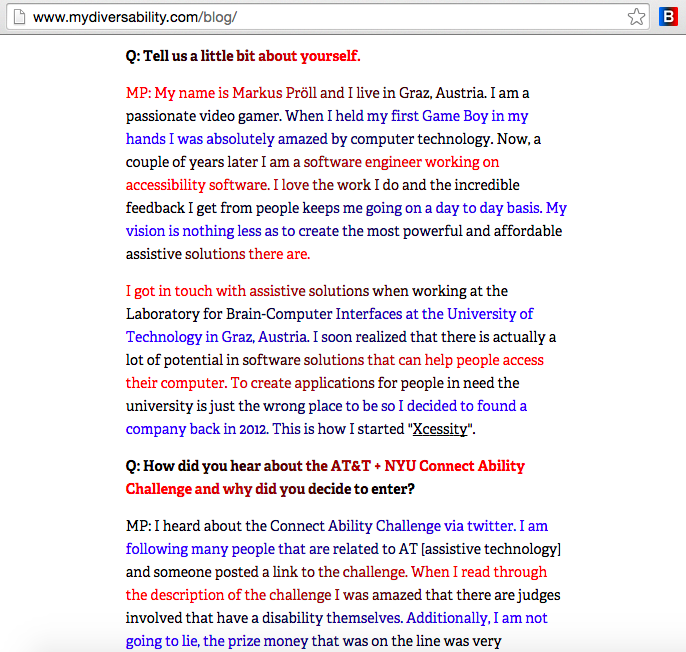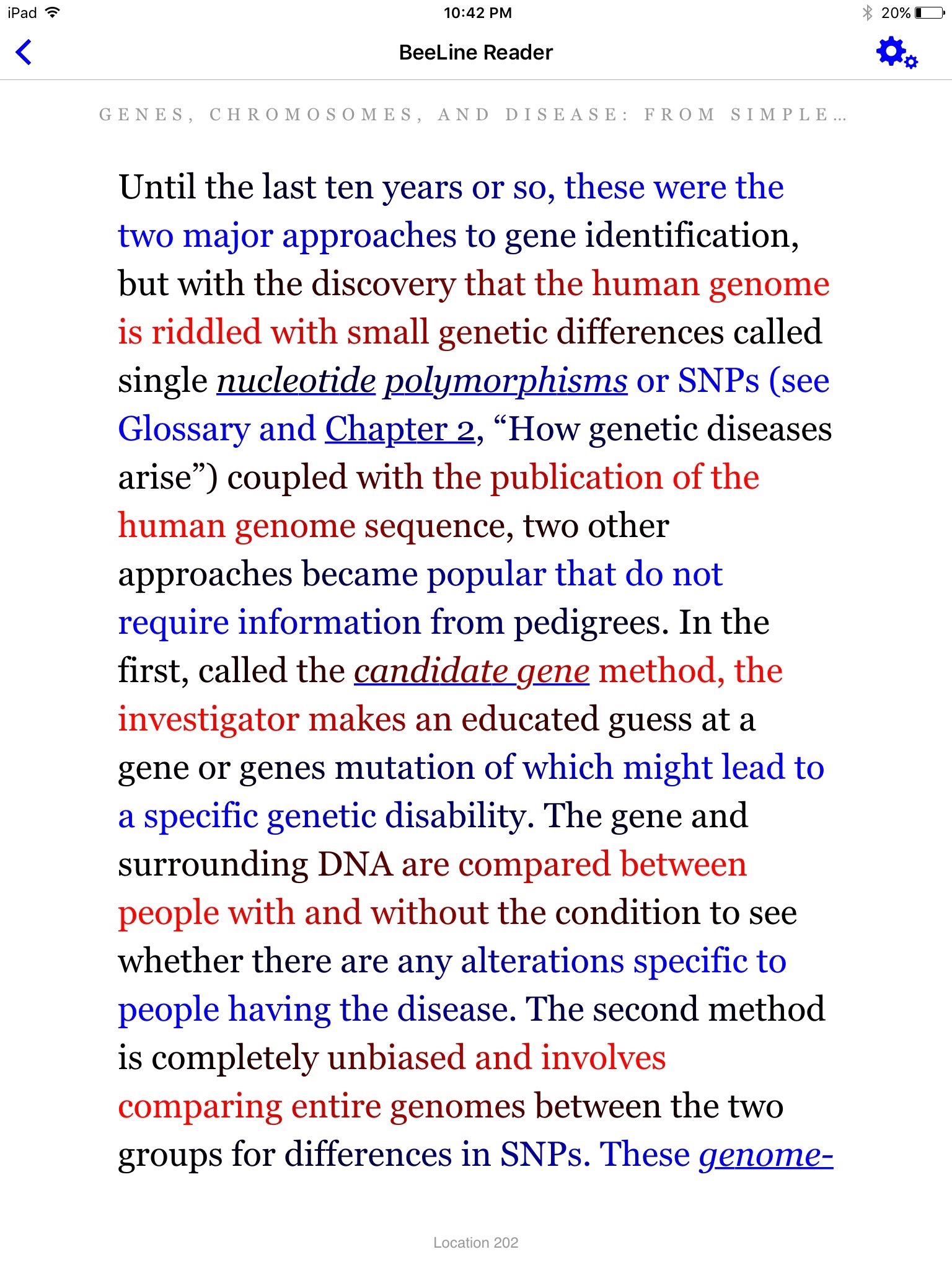Q&A with Nick Lum, Founder of BeeLine Reader and 2015 Tech Awards Laureate
Last month, The Tech Awards, presented by Applied Materials, announced this year’s crop of 10 international laureates using technology to benefit humanity.
We were excited to find that BeeLine Reader, a digital tool that guides the eye for online reading, was one of the Tech Awards laureates receiving the Microsoft Education Award. Nick Lum, the founder of BeeLine Reader, has been an early Diversability supporter and we had the chance to chat with him about the story behind BeeLine.
BeeLine’s browser plugin works with our blog! If you’d like to read this with BeeLine, please install the plugin for free.
For Diversability readers only: want to read your Kindle books on BeeLine’s iPad app? Contact us for your 30-day free trial!
Nick Lum, founder of BeeLine Reader (photo provided by Nick Lum)
Q: Before diving in and talking about BeeLine, can you tell us a bit about yourself?
I grew up in California and went to college on the east coast. I studied economics and linguistics (I’ve always been interested in language), and then went to law school. I worked as a corporate tax attorney for seven years before leaving the law to launch BeeLine.
Q: How did you come up with the idea? Is there science behind it?
Although there is science that explains whey the concept makes sense, I was actually unaware of almost all of the relevant science when I developed the concept. It just seemed like a good idea, and most people find it to be intuitive.
Since launching BeeLine, I’ve learned that there’s a bunch of science around how our eyes and brain process color that makes BeeLine a good idea from a technology perspective. For example, our peripheral vision is very sensitive to color, which makes it good for using as a guide during line transitions.
I’ve also been surprised to learn how frequently readers—even skilled ones—make mistakes when transitioning between lines. We’re all familiar with accidental line-skipping or repeating, which happens infrequently for most readers.
But it turns out there’s another type of mistake, which we typically correct without being consciously aware that it’s even happened, that is much more common. This type of error is undershooting laterally—not moving our eyes far enough to the left, so we land on the second or third word on the line. This requires us to move our eyes again in order to get to the right place.
Although this isn’t as distracting or frustrating as line-skipping, it happens all the time. In research done by human-computer interface design folks at Google, skilled adult readers undershot line transitions 33% to 65% of the time, depending on text size.
So the science shows that there’s actually a frequent problem here—albeit one that we’re often not consciously aware of—and that using color is a good way to address this problem.
Q: What about the accessibility benefits? Is that based on the same concepts?
Yes and no. The same concepts are at play, but there’s more to it than that. For example, readers with attention deficits find that the color gradients also help enhance focus. Readers with dyslexia also find the color gradient to be helpful in focusing attention on the text, making it less of a “wall of text” that is otherwise difficult to read.
Q: What is your vision for BeeLine? How do you see yourself getting there?
Having seen what a big difference BeeLine makes for many readers, we want to make it possible for anyone to read anything with these color gradients. We think there are too many accessibility tools that are extraordinarily expense and unaffordable for many people. To combat this, we use a buy-one-give-one program so that kids in low-income schools can use BeeLine for free. We are so grateful for our many users who have opted to purchase our “Honey Bee” products that enable this philanthropic program.
We’re really excited that platforms are starting to embrace BeeLine, and we’re now integrated into a couple of reading platforms. This is the future for BeeLine: our apps and plugins will get us part way, but in order to achieve true accessibility we’ll need to partner with content companies and device manufacturers to make this a reality. This is because mobile apps are silos (unlike the web, which is more open), and our plugins can’t run inside of silo’d apps.
Q: Tell us a little bit about the Tech Awards (congrats, by the way). How did you hear about it and did you think you would win?
I first found out about The Tech Awards from an education technology coordinator at a local school. He suggested that we would be a good fit for what they are looking for. But when I looked at the list of past winners (Khan Academy, Project Gutenberg, Kiva.org), I thought we didn’t stand a chance. But I decided to apply anyway, and we ended up making it all the way. Working with The Tech Awards folks, including the Education sponsor (Microsoft) has been a wonderful opportunity, and we are already partnering with one past winner (Benetech, whose Bookshare platform is used by many readers with learning differences).
Tech Awards (photo provided by Nick Lum)
Q: What does "diversability" mean to you? How can readers be helpful to you as your company grows?
Diversability boils down to empathy and open-mindedness. In our relatively short history, we have learned so much from users with a wide range of cognitive and visual differences. We are indebted to their willingness to share their experiences, describe their lives, abilities, and difficulties, and suggest ways to make BeeLine Reader more useful for them. These users have helped shape our products and our vision for the company.
Our next challenge is engaging with content companies (online news sites, book publishers, bloggers, etc.) and convincing them that they should make their content accessible in this way. We are always looking for new platform partners, so if you happen to know of anyone who might be interested in making their text more accessible, please send them our way: contact@BeeLineReader.com.




